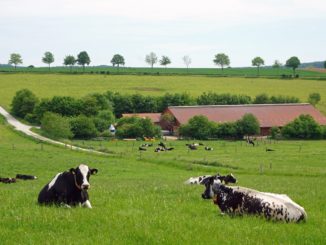One of the highlights of this year’s Oxford Real Farming Conference (#ORFC2016) was the launch of a rural manifesto by the Landworkers Alliance and Land Magazine. Called Equality in the Countryside: a rural manifesto for the parliamentary opposition, the manifesto was launched on Wednesday 6th January in the Old Library of Oxford Town Hall.

It includes 46 action points, on matters such a housing, land ownership, agriculture and rural employment. These all have the common aim of making Britain’s rural land and resources more accessible to a wider constituency of people. “
Land access, human-scale farming, housing, energy, environmental protection, employment, education and transport are the cornerstones of the document.
The manifesto makes clear the chasm between the wealthy and the poor, especially in the rural setting.
The British countryside, and more particularly lowland England, is enjoying unparalled prosperity. Newly-thatched cottages, gleaming Range Rovers, 300 horse power tractors, and rolling seas of subsidised wheat and barley testify that the countryside harbours a great deal of wealth. However this opulence is not shared by everyone who lives there; it masks an obstinate persistence of age-old inequalities, and a significant level of what is now termed “hidden poverty”.
Impressive in scope, the manifesto considering historical causes, including the Corn Law repeals of 1840, the unfairness of CAP subsidy payments, while also offering lots of very practical solutions to current realities.
The root cause of the gap between urban and rural wages lies in the fact that the rural economy, reliant on the dispersed production of primary commodities, is vulnerable to competition from global markets and to aggressive price bargaining from cartels of processors and distributors (supermarkets) — whereas large sections of the urban service economy are immune from these forces. This explains why less than ten per cent of earnings from the UK food industry go to UK farmers and fishermen.
Controversial Guardian columnist George Monbiot emphasised the land and equity point, reminding attendees that the UK was one of the only parts of Europe not to have significant land reform.
A key class distinction the Manifesto spotlighted is the residents vs workers wealth gap. Whereas rural residents earn £90 more on average than urban residents, rural workers earn £90 less. This was in fact one of the most tweeted tidbits from the conference.

Indeed the conference hashtag #ORFC2016 rather incredibly, for what is ostensibly an alternative take on agri-food and the rural issues, trended on twitter.

This former alternative now, it seems, is gaining a higher profile than the other longer running, mainstream Oxford Farming conference. Perhaps the same will soon be said for WirHabenEsSatt (We Are Fed Up) in Berlin January 16th, coming as it does just before Greenweek.
The alternative is becoming mainstream, as farm incomes plummet and public goods fail to get delivered by the CAP.
More
Rural Parliament Manifesto (2015)
Organic and small-scale: An alternative vision for the future of farming (2016 review of #ORFC2016)





